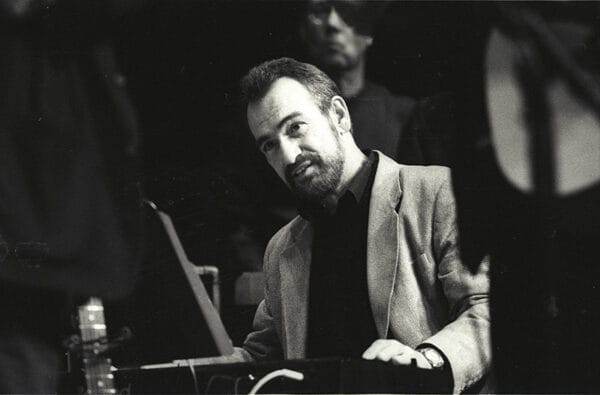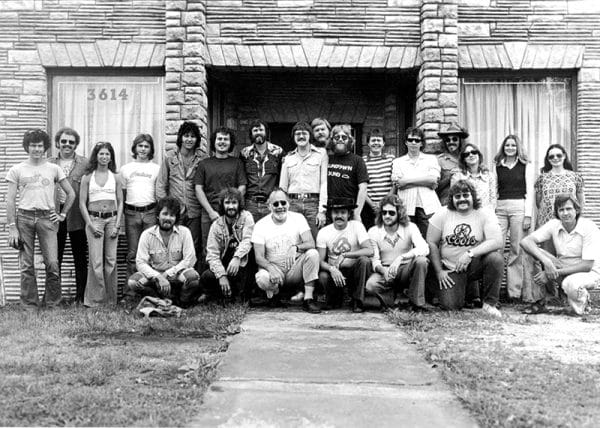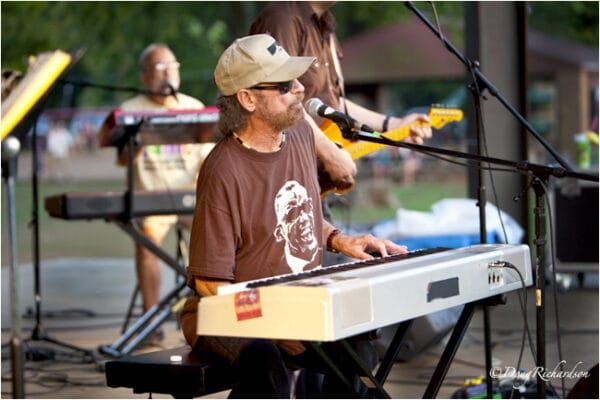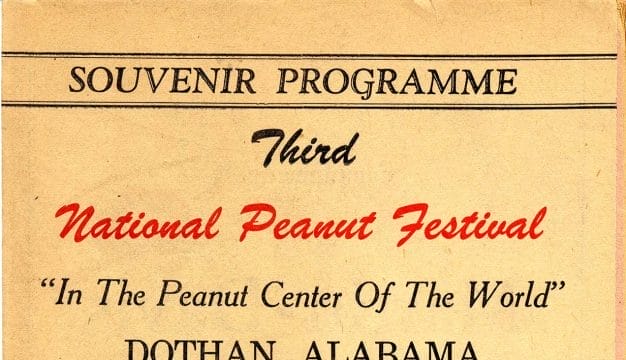Donnie Fritts
In the 1960s and 1970s, songwriter and musician Donnie Fritts (1942-2019) wrote and performed unique and innovative songs that blended rhythm and blues (R&B), rock, and country. He helped to blur the racial lines in music at a time when the civil rights movement was reaching its height. He began playing drums in the Muscle Shoals music scene and in the late 1950s and early 1960s performed with Hollis Dixon and the Keynotes, Dan Penn’s Mark V and the Pallbearers and emerged by the mid-1960s as an important songwriter with a significant career in Nashville. He received the America’s Music Award from the Alabama Music Hall of Fame in 1995 and was inducted into that institution in 2008.
 Donnie Fritts
Born on November 8, 1942, in Florence to Huey and Helen Fritts, Donnie grew up in a musical family. His father owned a construction business and on weekends played guitar and bass with big band leader Edsel Holden’s swing bands on weekends. Although he learned music theory from his father, Donnie was largely self-taught, experimenting in songcraft with fellow songwriters David Briggs, Spooner Oldham, and Dan Penn at Stafford Publishing and Recording (SPAR) in Florence. Along with fellow Florence drummers Jerry Carrigan and Mike Shepherd, Fritts was a member of Florence’s Coffee High School band, which gained notoriety for incorporating Afro-Caribbean rhythms into its performances. The admiration that Fritts and his cohorts gained for this music manifested itself in the music that they later contributed to the Muscle Shoals sound.
Donnie Fritts
Born on November 8, 1942, in Florence to Huey and Helen Fritts, Donnie grew up in a musical family. His father owned a construction business and on weekends played guitar and bass with big band leader Edsel Holden’s swing bands on weekends. Although he learned music theory from his father, Donnie was largely self-taught, experimenting in songcraft with fellow songwriters David Briggs, Spooner Oldham, and Dan Penn at Stafford Publishing and Recording (SPAR) in Florence. Along with fellow Florence drummers Jerry Carrigan and Mike Shepherd, Fritts was a member of Florence’s Coffee High School band, which gained notoriety for incorporating Afro-Caribbean rhythms into its performances. The admiration that Fritts and his cohorts gained for this music manifested itself in the music that they later contributed to the Muscle Shoals sound.
In 1957, Donnie Fritts—along with Tom Stafford, Billy Sherrill, Rick Hall, Dan Penn, Spooner Oldham, and David Briggs—worked at SPAR music, a fledgling studio that would later become Florence Alabama Music Enterprises, better known as FAME Studios. During these years, Fritts cowrote “Sorry I’m Late, Lisa,” a minor hit for Tommy Roe. He was writing for FAME in the early 1960s when Arthur Alexander’s self-penned hit “You Better Move On” (1961) became the quintessential model for the prototypical country-soul style that Fritts would come to embrace. During his years at FAME, Fritts and Dan Penn composed the song “Rainbow Road.” The song’s narrative depicts the tragic interplay of the promise of social mobility out of poverty and the harsh realities of racial prejudice and violence in southern society. The song was covered by Alabamians Percy Sledge and Arthur Alexander. Although the song’s narrative was fictional, Alexander’s powerful rendition persuaded many listeners that the account was his own life story. In 1965, Fritts joined many of his FAME colleagues and moved to Nashville to seek more rewarding musical opportunities and further his career.
In the mid-1960s, Fritts wrote songs for a number of important publishing companies. Upon relocating to Nashville, he signed on as a writer with Shelby Singleton, the Mercury Records producer famed for recording the hit “Sea of Love.” Fritts also wrote under contract for Screen Gems’ publishing division, April Blackwood, the CBS publishing affiliate, and Combine Music, the publishing arm of Fred Foster’s Monument Records (Kris Kristofferson’s label). In 1968, he penned his first major hits, including “A Nice Place to Visit,” recorded by Dan Penn, and with guitarist Eddie Hinton co-wrote “Choo-Choo Train,” for The Box Tops and “You’re All Around Me” for Shoals-native Percy Sledge. The following year, Fritts and Hinton contributed “Breakfast in Bed” to British singer Dusty Springfield’s album Dusty in Memphis, produced by Jerry Wexler.
 Muscle Shoals Sound Studio
In 1970, Fritts joined Kris Kristofferson’s band as keyboardist for its opening of San Francisco’s Troubadour concert facility as well as a concert at the Isle of Wight Festival in Great Britain. Fritts soon became a central figure in what became known as the “outlaw country” scene, which centered around Willie Nelson, Johnny Cash, and Waylon Jennings, all of whom performed often with Kristofferson as the vocal quartet The Highwaymen. Fritts’s songwriting talents soon were in high demand. Over the next few years, Fritts’s songs were recorded by such major country music artists as Charlie Rich, Jerry Lee Lewis, and Ronnie Milsap. Soul artist Joe Simon had a No. 12 R&B hit with Fritts’s “Easy to Love,” which he recorded at Muscle Shoals Sound Studio in Sheffield.
Muscle Shoals Sound Studio
In 1970, Fritts joined Kris Kristofferson’s band as keyboardist for its opening of San Francisco’s Troubadour concert facility as well as a concert at the Isle of Wight Festival in Great Britain. Fritts soon became a central figure in what became known as the “outlaw country” scene, which centered around Willie Nelson, Johnny Cash, and Waylon Jennings, all of whom performed often with Kristofferson as the vocal quartet The Highwaymen. Fritts’s songwriting talents soon were in high demand. Over the next few years, Fritts’s songs were recorded by such major country music artists as Charlie Rich, Jerry Lee Lewis, and Ronnie Milsap. Soul artist Joe Simon had a No. 12 R&B hit with Fritts’s “Easy to Love,” which he recorded at Muscle Shoals Sound Studio in Sheffield.
In 1972, Fritts co-wrote “300 Pounds of Hungry” with Eddie Hinton and “Take Time to Love” with Tony Joe White; both appeared on White’s The Train I’m On produced by Wexler. Kristofferson and Rita Coolidge also recorded “Take Time to Love” on their Full Moon album. The following year, Waylon Jennings had a hit with “We Had It All,” written by Fritts and Troy Seals for Jennings’s Honky Tonk Heroes (1973). The song was covered by Ray Charles, the Rolling Stones, Tina Turner, and Keith Richards and Willie Nelson, who recorded the song on Willie Nelson and Friends (2003). Dan Penn and Fritts cowrote “Tear Joint,” backed by the Muscle Shoals Rhythm Section in a decidedly country vein, which was released on Penn’s highly praised album Nobody’s Fool (1973). Billy Swan, who was also in Kristofferson’s band, recorded Fritts’s “Pardon Me” in Muscle Shoals (1974). Also in 1974, Jerry Wexler produced Fritts’s solo album Prone To Lean at Muscle Shoals Sound Studio.
Fritts also has had an incidental acting career, performing in a number of films by director Sam Peckinpah, including Pat Garrett and Billy the Kid (1973), Bring Me the Head of Alfredo Garcia (1974), and Convoy (1978). Fritts went on to appear in 15 movies, including A Star Is Born (1976), which also starred Kristofferson in the lead role. Fritts played on the theme song, “Evergreen,” which garnered an Academy Award for best song that year. Fritts joined Kristofferson and Willie Nelson in the film Songwriter in 1984, playing the role of a bandmember.
In the 1980s and later, Fritts continued a career as a singer-songwriter. He co-wrote with John Prine in the early 1980s, contributing “The Oldest Baby in the World” and “Somewhere Someone’s Falling in Love” for Prine’s Aimless Love album (1984). Arthur Alexander’s 1992 album Lonely Just Like Me featured a few of Fritts’s originals, including the track “If It’s Really Gotta Be This Way” (with Alexander and Gary Nicholson), “Sally Sue Brown” (Alexander/Stafford), and “All The Time” (Fritts/Alexander).
 Donnie Fritts, 2011
In the 1990s, Fritts returned to Muscle Shoals and contributed songs for Dan Penn’s 1994 Muscle Shoals set Do Right Man. On that album, he co-wrote the ubiquitous “Memphis Women and (Fried) Chicken” and “He’ll Take Care of You” (both with Penn and Gary Nicholson), and the resoundingly soulful “Zero Willpower” (with Oldham and Penn). In 1997, Fritts recorded a second solo album, Everybody’s Got a Song, on John Prine’s Oh Boy label, an album of duets with Prine, Dan Penn, Tony Joe White, Eddie Hinton, Lucinda Williams, Willie Nelson, Delbert McClinton, and Kris Kristofferson. He wrote briefly under the Maypop banner, part of the organization headed by the band Alabama, he decided to return to his roots. His musical efforts were recharged through an association with the Shoals-area band The Decoys, whose musicians had played with such famous acts as the Allman Brothers, the Muscle Shoals Rhythm Section, the Amazing Rhythm Aces, Little Richard, and Bonnie Bramlett. For the two-volume compilation Country Got Soul (Casual Records, 2003-2004), Fritts contributed the song “Muscle Shoals,” a story song of the history of the Muscle Shoals “sound.” In 2008, he released One Foot in the Groove, on his own Leaning Man Records label, features collaborations with southern soul stalwarts Tony Joe White, Billy Swan, Dan Penn, The Decoys, and members of the Memphis Horns and Muscle Shoals Horns. Typical of Fritts’s eclectic sensibility, the album features the Tex-Mex rhumba “Huevos Rancheros”; Fritts was frequently associated with the Americana style, which is an amalgam of Appalachian, country, and rhythm and blues, along with Cajun, and southwestern rhythms. Fritts died on August 27, 2019, several weeks after heart surgery.
Donnie Fritts, 2011
In the 1990s, Fritts returned to Muscle Shoals and contributed songs for Dan Penn’s 1994 Muscle Shoals set Do Right Man. On that album, he co-wrote the ubiquitous “Memphis Women and (Fried) Chicken” and “He’ll Take Care of You” (both with Penn and Gary Nicholson), and the resoundingly soulful “Zero Willpower” (with Oldham and Penn). In 1997, Fritts recorded a second solo album, Everybody’s Got a Song, on John Prine’s Oh Boy label, an album of duets with Prine, Dan Penn, Tony Joe White, Eddie Hinton, Lucinda Williams, Willie Nelson, Delbert McClinton, and Kris Kristofferson. He wrote briefly under the Maypop banner, part of the organization headed by the band Alabama, he decided to return to his roots. His musical efforts were recharged through an association with the Shoals-area band The Decoys, whose musicians had played with such famous acts as the Allman Brothers, the Muscle Shoals Rhythm Section, the Amazing Rhythm Aces, Little Richard, and Bonnie Bramlett. For the two-volume compilation Country Got Soul (Casual Records, 2003-2004), Fritts contributed the song “Muscle Shoals,” a story song of the history of the Muscle Shoals “sound.” In 2008, he released One Foot in the Groove, on his own Leaning Man Records label, features collaborations with southern soul stalwarts Tony Joe White, Billy Swan, Dan Penn, The Decoys, and members of the Memphis Horns and Muscle Shoals Horns. Typical of Fritts’s eclectic sensibility, the album features the Tex-Mex rhumba “Huevos Rancheros”; Fritts was frequently associated with the Americana style, which is an amalgam of Appalachian, country, and rhythm and blues, along with Cajun, and southwestern rhythms. Fritts died on August 27, 2019, several weeks after heart surgery.
Additional Resources
Guralnick, Peter. Sweet Soul Music: Rhythm and Blues and the Southern Dream of Freedom. Boston: Back Bay Books, 1999.
Hoskyns, Barney. Say It One Time for the Brokenhearted: The Countryside of Southern Soul. New York: HarperCollins, 1998.
Wexler, Jerry, with David Ritz. Rhythm and the Blues: A Life in American Music. New York: St. Martin’s Press, 1994.



